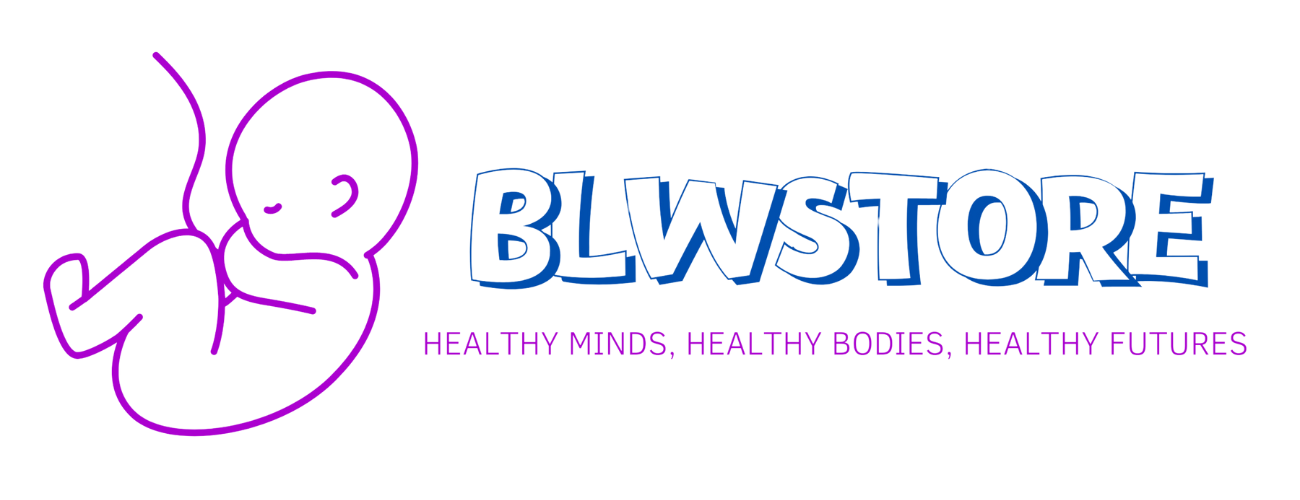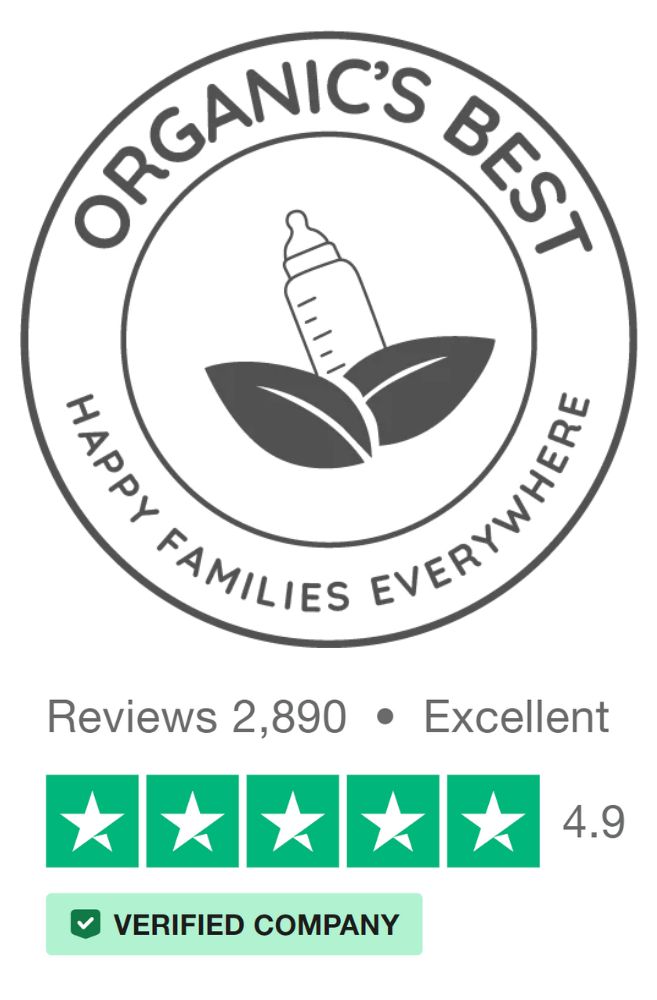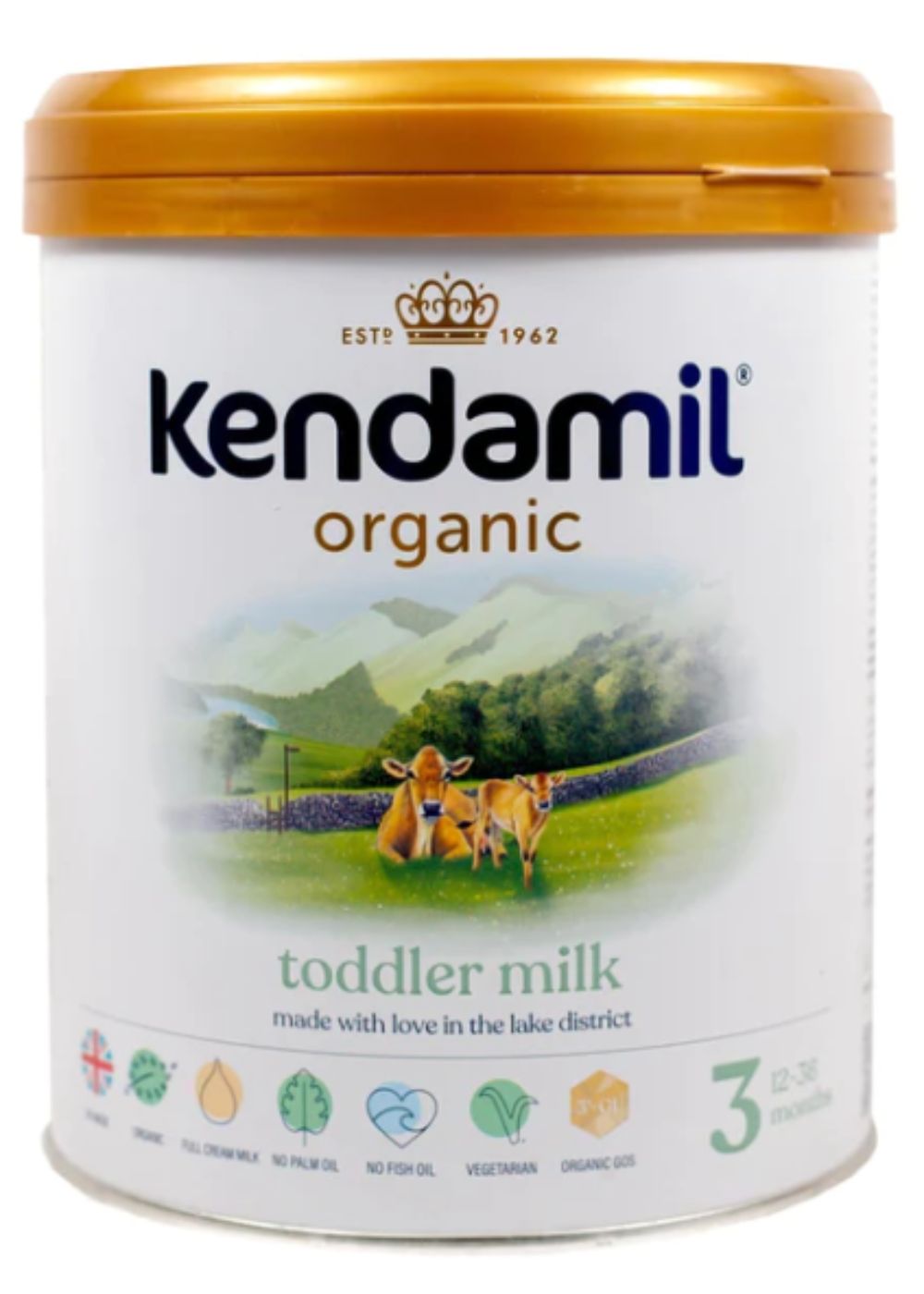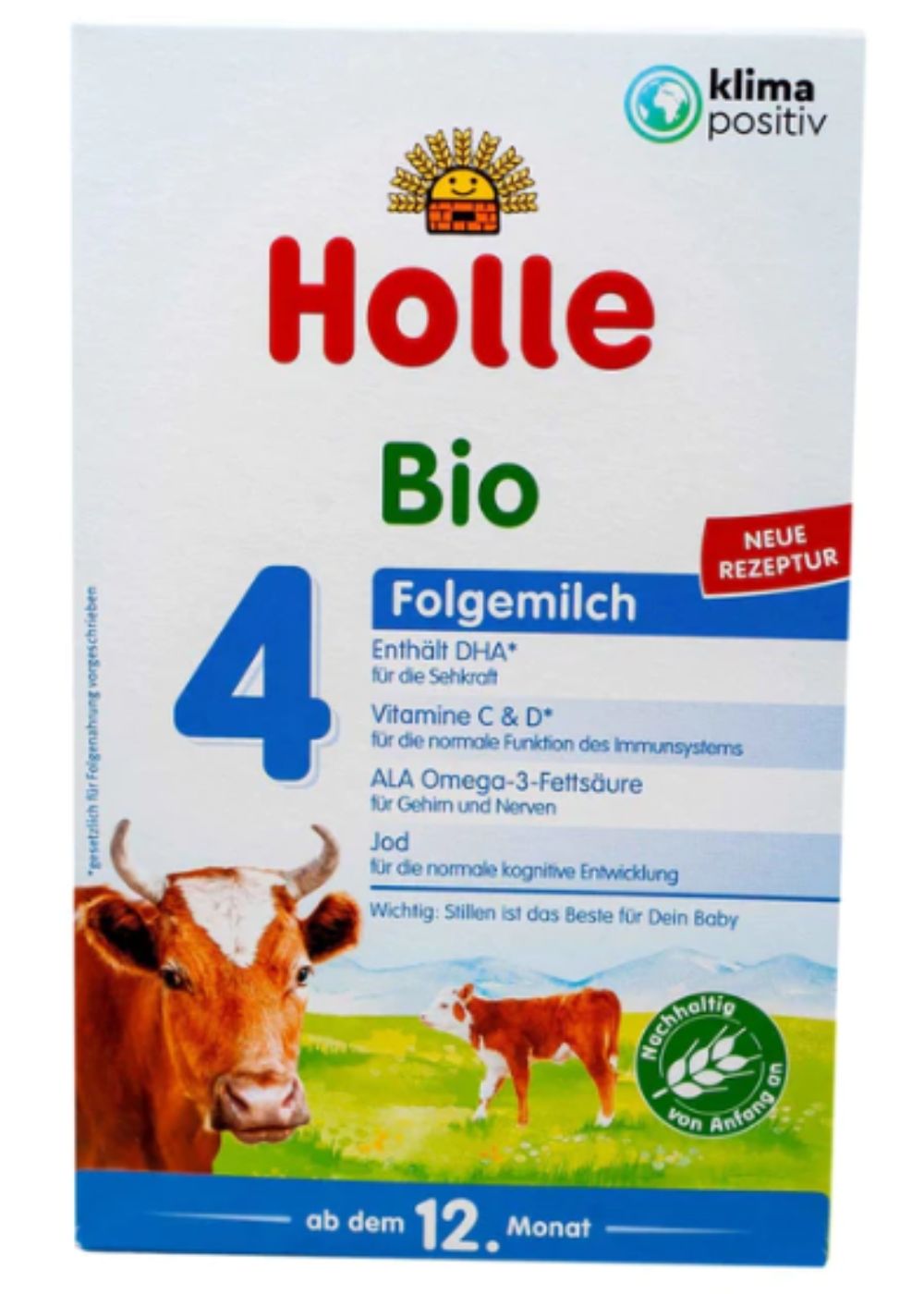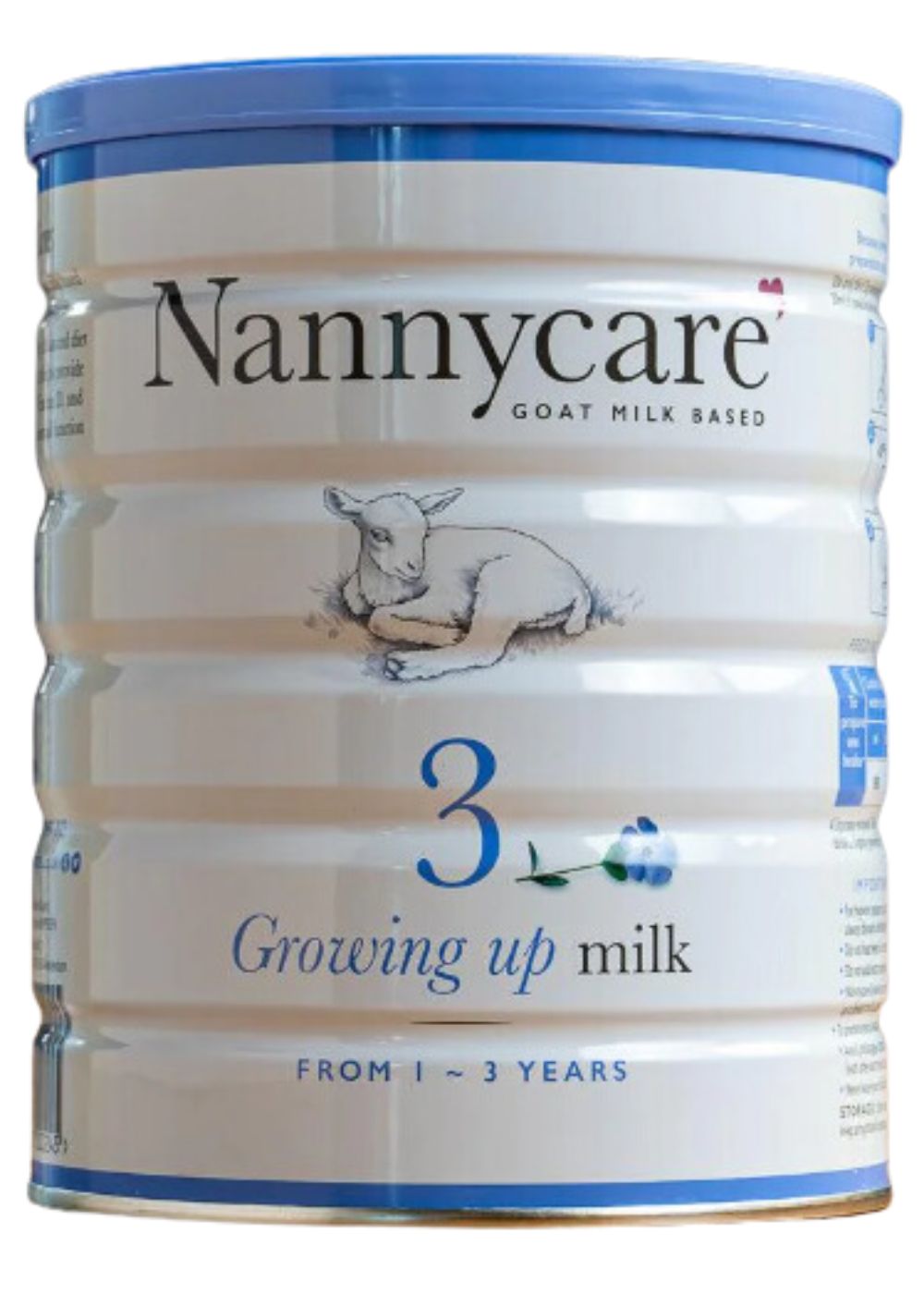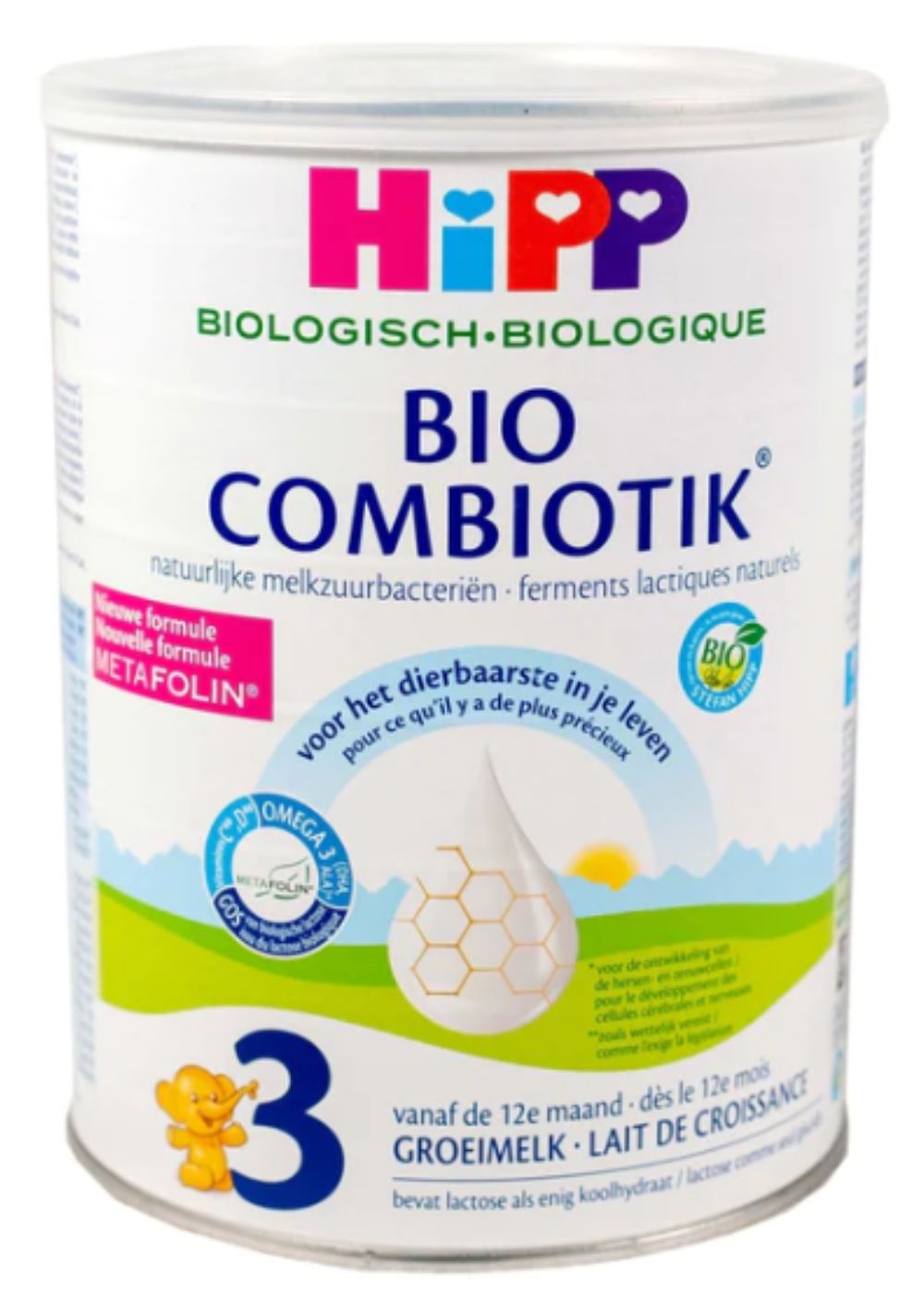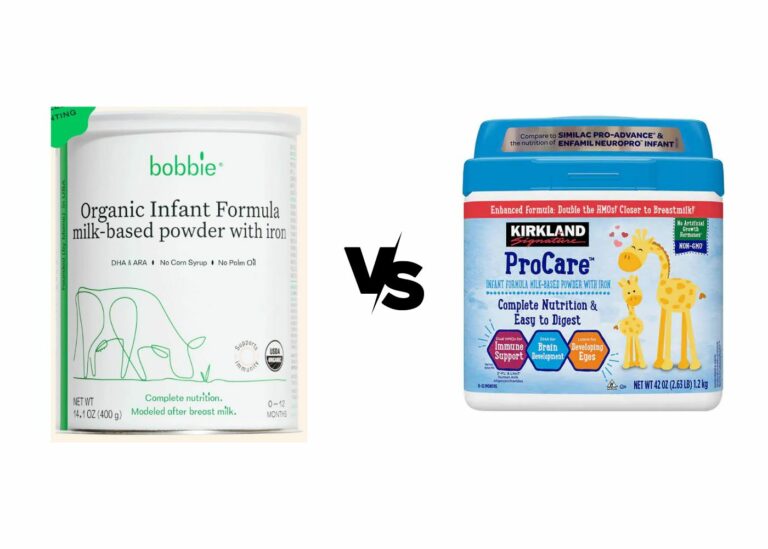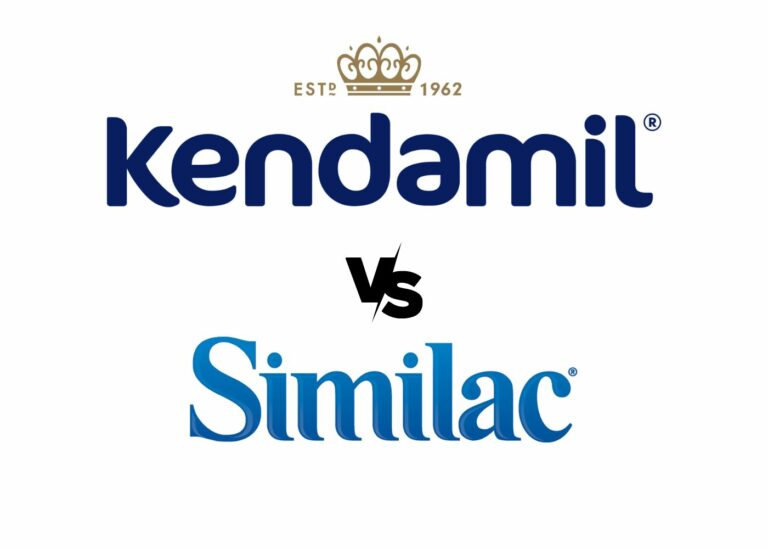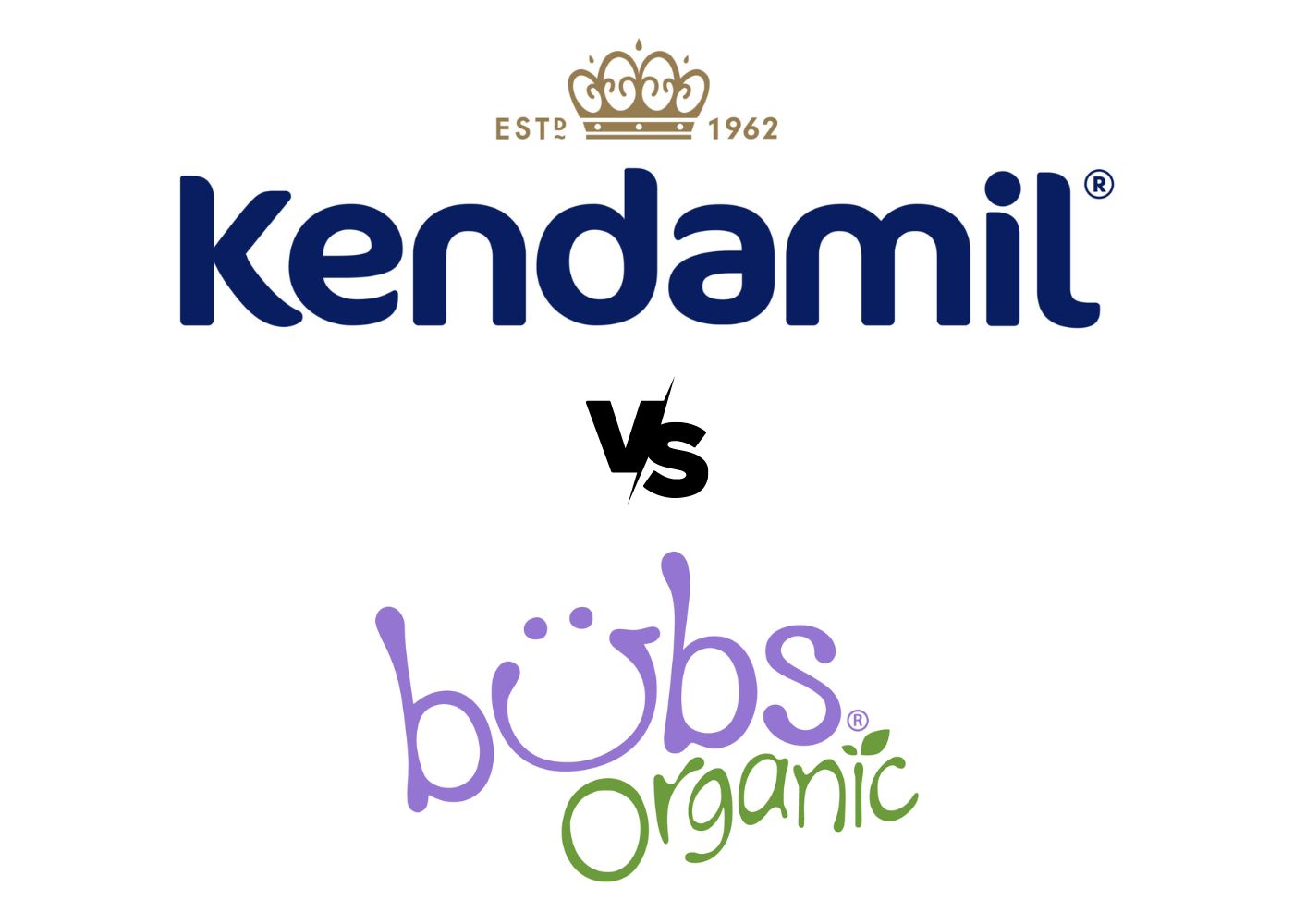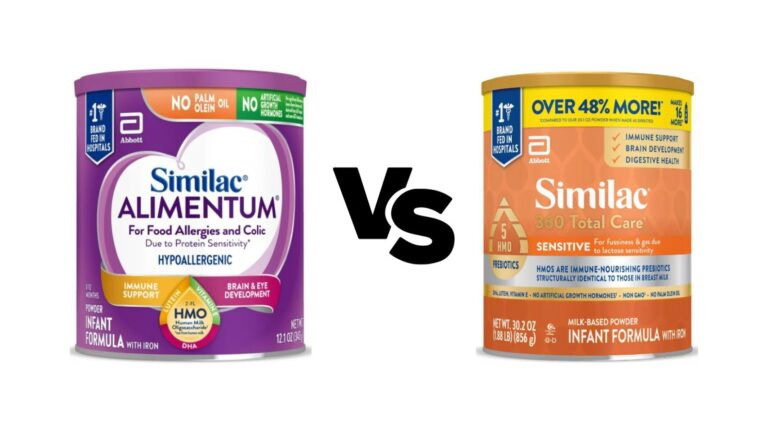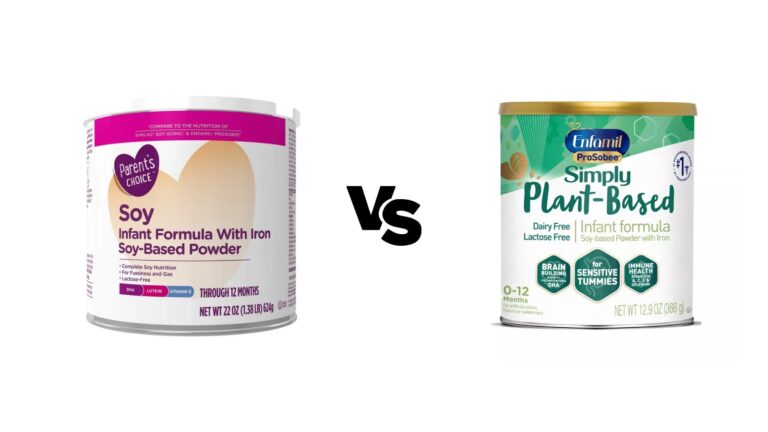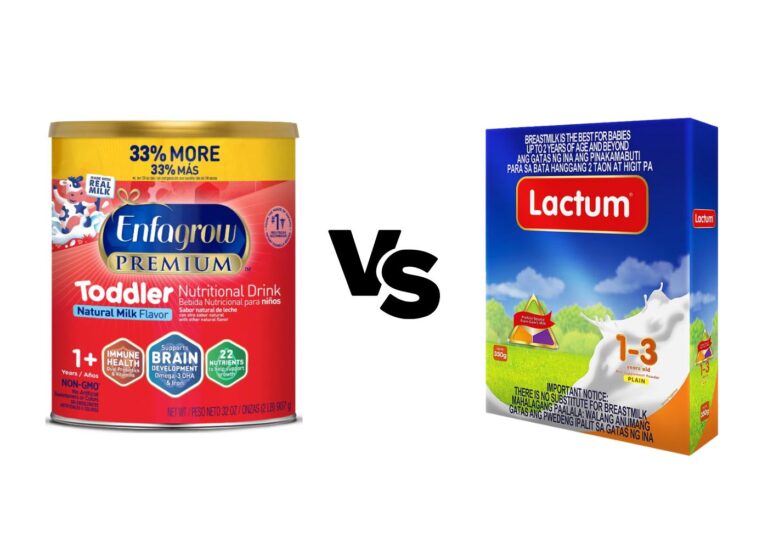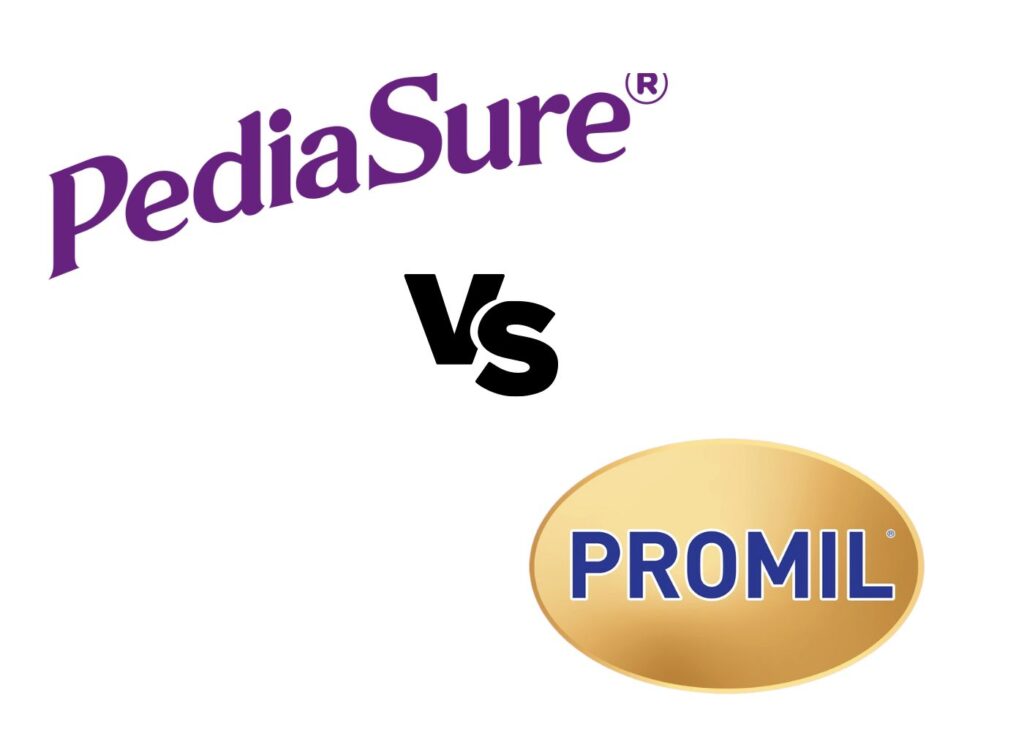
Key Differences Table Between Pediasure and Promil
| Features/Aspect | Pediasure | Promil |
|---|---|---|
| Ideal For | Kids with lactose intolerance | Overall nutrition for kids between 1-3 years old |
| Protein Source | Milk protein concentrate and soy protein isolate | Cow’s milk proteins enriched with Alpha-Lactalbumin |
| Carbohydrate Source | Corn maltodextrin and sugar | Lactose, maltodextrin, and skimmed milk powder |
| Fats and Oils | High oleic safflower oil, soy oil, MCTs | Vegetable oils (soybean, palm, palm kernel) with DHA and AA |
| Nutritional Benefits | Essential nutrients, vitamins, minerals, GMO-free, gluten-free | DHA for brain and eye health, prebiotics for digestion |
| Prebiotics/Probiotics | None | Contains oligofructose (prebiotic) |
This article will compare two popular toddler formulas: Pediasure and Promil.
We will analyze their ingredients and nutritional compositions to help you make an informed decision for your little one.
Let’s get after it!
*Related reads: Enfagrow vs Promil | Pediasure vs Enfagrow
Our Short Answer
After analyzing both drinks, if we had to choose one, it would be Promil for several reasons:
- It uses lactose, and not only maltodextrin
- It does not add extra sugar
- It includes DHA in its fat blend
- It has prebiotics
The only reason to choose Pediasure would be if your child had lactose intolerance, only in that case, it would be the better option.
Having said this, we strongly recommend you to look at the alternatives below, as there are much better toddler formulas available.
With over 100,000 orders delivered globally since 2019, Organic's Best offers clean, safe, and nutritionally rich formulas and snacks.
Free shipping over $100, commitment to freshness and authenticity.
- Express delivery in 2 to 5 business days
- Sourcing from European manufacturers
- Minimum shelf life of 6 months
- Climate-Controlled Warehouse
Give your little one the best start.
CODE 'BLW' for a 5% discount in all orders
Overview of the Two Formulas
Pediasure supports kids’ growth with essential nutrients, vitamins, and minerals, ideal for those not getting enough from food. It’s GMO-free, gluten-free, suitable for lactose-intolerant kids, and boosts the immune system.
Promil Gold, targeting 1-3-year-olds, enhances development with DHA, AA, and easy-to-digest proteins, focusing on brain health.
Pediasure
Pediasure is a special drink made to help kids who might not be eating enough healthy food grow well and stay strong.
It’s designed to ensure kids get everything they need, like vitamins, minerals, and protein.
Parents often pick Pediasure when they worry their kid isn’t getting enough nutrients from regular meals.
It’s designed for children with difficulty growing and is packed with ingredients to support their immune system.
It’s made without GMOs (which means no ingredients were made in a lab), it doesn’t have gluten (which some kids can’t eat because it makes them feel sick), it has no artificial growth hormones, and kids with lactose intolerance (who get tummy troubles from dairy) can still enjoy it.
Promil Gold
Promil is another special milk drink for kids between 1 and 3 years old.
It’s based on cow’s milk but has some extra good stuff added to ensure children get what they need to develop well, especially their brains.
The main idea behind Promil is to give children a nutritional boost with ingredients like DHA (a type of Omega-3 fatty acid that is great for brain health), AA (another nutrient superstar for growth), and some friendly fibers to help with digestion.
It also includes something called Alpha-Lactalbumin, which is a fancy name for a protein that’s easy for little tummies to digest. It comes from the Philippines and aims to be more than just regular milk – it’s milk plus a lot more nutrition to help young brains and bodies bloom.
Nutritional Composition
Pediasure combines milk protein concentrate and soy protein isolate for muscle growth, while Promil uses cow’s milk proteins with Alpha-Lactalbumin for easy digestion and brain development.
Pediasure’s carbs come from corn maltodextrin and sugar, offering quick energy, whereas Promil uses lactose and maltodextrin for steady energy release.
Pediasure’s fats include safflower and soy oils, aiming for brain support without heaviness, while Promil opts for vegetable oils and DHA for brain and eye health, making it nutritionally superior.
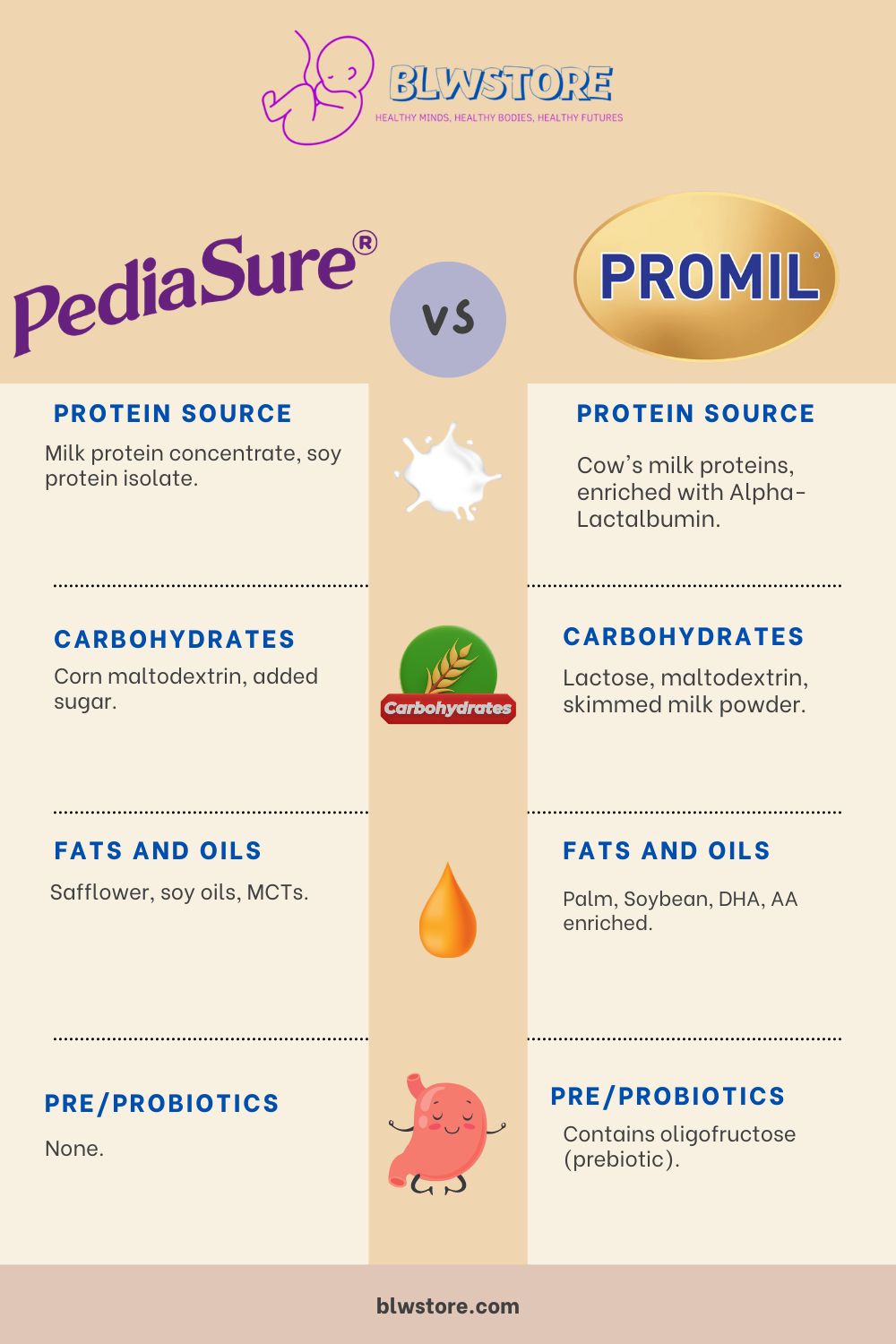
Protein Content
Pediasure: Pediasure gets its protein from two primary sources: milk protein concentrate and soy protein isolate. Milk protein concentrate is a super powdered form of the proteins found in milk. It helps kids build strong muscles. Soy protein isolate is another muscle-builder that comes from soybeans.
Promil: Promil, on the other hand, relies mainly on cow’s milk-based proteins enriched with Alpha-Lactalbumin to make it extra beneficial for tiny tots. Alpha-lactalbumin helps little ones digest their milk easily while boosting their brain development.
On paper, Promil has a better protein source, as it comes from cow’s milk and it’s improved with Alpha Lactalbumin.
Pediasure has milk protein concentrate, which is OK, but it adds soy protein, which is nutritionally worse than conventional milk because it has less bioavailability. This, however, might be beneficial for kids who have problems digesting cow’s milk protein, so take that into account.
Learn more: Soy Protein in Formula
Carbohydrate Content
Pediasure: The carbs in Pediasure mainly come from corn maltodextrin, and sugar. Corn maltodextrin is a kind of energy booster that’s easy on the tummy, while sugar sweetens the deal, making sure kids enjoy their healthy shake.
Promil: For Promil, carbohydrates are provided by lactose (natural milk sugar), maltodextrin (like Pediasure), and skimmed milk powder, which adds a creamy texture. These sources offer a more gradual energy release, helping keep kids active without the sudden highs and lows.
Promil has a more natural source of carbohydrates, as it uses lactose, the same sugar found in milk. It also adds some maltodextrin.
Pediasure has maltodextrin and sugar. This is by far ideal. Maltodextrin is understandable as Pediasure is suitable for babies with lactose intolerance; however, adding extra sugar to make it sweeter is a bad move and not ideal at all.
Learn more: Maltodextrin in Formula
Fats and Oils
Pediasure: The fat content in Pediasure comes from a blend of high oleic safflower oil, soy oil, and medium-chain triglycerides (MCTs). These fats are chosen for their health benefits, including supporting brain development and providing energy without being too heavy on little stomachs.
Promil: Promil’s fats are sourced from a mix of vegetable oils (soybean, palm, palm kernel). It also includes special fatty acids called DHA and AA from single-cell sources. DHA and AA are superstars for brain and eye health, making them critical components in helping children’s physical and mental growth.
Promil is ahead in nutrition because it includes DHA, which is good for health. Although it uses palm oil, which isn’t great for the environment, it’s better for you than other oils like safflower or soy oil. Pediasure tries to catch up by adding MCTs, but it still doesn’t match up to Promil’s DHA benefit.
Learn more: Palm Oil in Formula | DHA and ARA in Formula | Vegetable Oils in Formula
Prebiotics and Probiotics
Probiotics are the good bacteria that keep our gut healthy, while prebiotics are the food that feeds those good bacteria.
Pediasure does not list probiotics or prebiotics among its ingredients.
Promil contains oligofructose as a prebiotic. Oligofructose is a type of fiber that helps feed the good bacteria in our guts.
What are the Best Alternatives to Pediasure and Promil?
When looking for the best toddler formulas, it’s a great idea to consider products without soy and soy or high oleic oils and simple sugars, which might not be ideal for every little tum.
Also, picking options with the least amount of additives ensures that what you’re giving your child is as close to nature as possible.
Here are some of our favorite alternatives:
- Kendamil Stage 3: This formula stands out because it uses whole milk and natural ingredients from organic sources. It’s like giving your child a taste of pure nature with the added benefit of essential nutrients for growth and development.
Kendamil Organic Formula Stage 3 is designed for toddlers 12+ months, offering essential nutrients from 100% organic cow's milk without additives. It's EU Organic Certified, ensuring a high-quality, healthy choice for your baby.
- 100% Organic Cow's Milk
- Rich in Vital Nutrients
- Free from Unwanted Additives
- EU Organic Certified
- Environmentally and Health-Conscious
- Holle Stage 3 and 4: Known for its complete nutrition profile, Holle also has the Demeter Certification, highlighting its commitment to biodynamic and sustainable farming methods. It’s not just good for your toddler but the planet too!
Holle Stage 4, for ages 12 months to 3 years, complements breastmilk with organic ingredients, supporting brain development and digestion with nutrients like DHA, iron, and Vitamin D.
- Demeter certified organic
- NO artificial sweeteners, flavors, GMOs or preservatives
- Gluten and soy free
- Short ingredients list
- Filling
- Contains DHA (Omega 3) & ARA (Omega 6)
- Nannycare Stage 3: If you want something gentler on little stomachs and made from goat milk, Nannycare Stage 3 is your go-to. It’s often praised as the best goat milk toddler formula for its digestibility and nutrition profile.
Nannycare Stage 3, from 12 months, complements breastmilk with full cream goat's milk, free from palm oil and maltodextrin, supports digestion, and is rich in Omega-3 (DHA), vitamins, and minerals for growth.
- Whole goat's milk
- Low-allergen milk protein
- Free of palm oil, whey, maltodextrin, and soy
- Contains DHA (Omega-3)
- Rich in vitamin C, D3, calcium, and iron to support growth and development
- Hipp Dutch Stage 3: This formula shines thanks to its inclusion of prebiotics and probiotics – those gut-friendly elements we discussed. It supports not just physical growth but also a happy, healthy tummy.
HiPP uses probiotic lactic acid cultures cultivated from real breast milk to make a natural formulation that aids with your baby’s digestion. Stage 3 is designed with less lactose and doesn't contain whey, starch, or maltodextrin.
- EU organic certified
- No artificial sweeteners or GMOs
- Enriched with prebiotics & probiotics
- Lactose only, no starch
- Contains ARA (Omega-6) & DHA (Omega-3)
Last Words
We hope this comparison between Pediasure and Promil helps you make the best decision for your little one.
Before you make a purchasing decision, we recommend you read more about the alternatives above; they truly are better options.
If you have any further questions, feel free to leave a comment or contact us at [email protected].
Happy feeding!
We’re Maria and Alberto, a married couple and educators who are nutrition enthusiasts. Even before we had kids, we were already crazy about nutrition.
We’d read scientific articles, watch videos from nutritionists, and spend hours listening to nutrition podcasts.
Today, we continue doing this, but in a different way, as we’ve learned to sift through the noise and trends. Nutrition, like any other field of knowledge, the more you read and learn, the more you develop a comprehensive understanding of reality, and that’s what has happened to us.
Before having our first child, we focused on learning everything we could about child nutrition, using the same techniques we had already employed, backed by our extensive knowledge in nutrition.
Our mission is to help other parents with their children’s nutrition, to help them become the best versions of themselves.
If we are what we eat and drink, which is absolutely true, let’s do it right!
